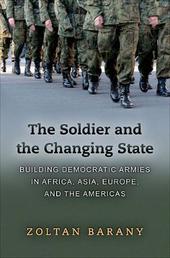
|
The Soldier and the Changing State: Building Democratic Armies in Africa, Asia, Europe, and the Americas
Hardback
Main Details
| Title |
The Soldier and the Changing State: Building Democratic Armies in Africa, Asia, Europe, and the Americas
|
| Authors and Contributors |
By (author) Zoltan Barany
|
| Physical Properties |
| Format:Hardback | | Pages:472 | | Dimensions(mm): Height 235,Width 152 |
|
| ISBN/Barcode |
9780691137681
|
| Classifications | Dewey:355 |
|---|
| Audience | | Postgraduate, Research & Scholarly | |
|---|
| Illustrations |
9 tables.
|
|
Publishing Details |
| Publisher |
Princeton University Press
|
| Imprint |
Princeton University Press
|
| Publication Date |
16 September 2012 |
| Publication Country |
United States
|
Description
The Soldier and the Changing State is the first book to systematically explore, on a global scale, civil-military relations in democratizing and changing states. Looking at how armies supportive of democracy are built, Zoltan Barany argues that the military is the most important institution that states maintain, for without military elites who support democratic governance, democracy cannot be consolidated. Barany also demonstrates that building democratic armies is the quintessential task of newly democratizing regimes. But how do democratic armies come about? What conditions encourage or impede democratic civil-military relations? And how can the state ensure the allegiance of its soldiers? Barany examines the experiences of developing countries and the armed forces in the context of major political change in six specific settings: in the wake of war and civil war, after military and communist regimes, and following colonialism and unification/apartheid. He evaluates the army-building and democratization experiences of twenty-seven countries and explains which predemocratic settings are most conducive to creating a military that will support democracy. Highlighting important factors and suggesting which reforms can be expected to work and fail in different environments, he offers practical policy recommendations to state-builders and democratizers.
Author Biography
Zoltan Barany is the Frank C. Erwin, Jr., Centennial Professor of Government at the University of Texas and the author of "Democratic Breakdown and the Decline of the Russian Military" (Princeton).
Reviews"This is an important work on militaries in newly democratizing regimes. The scope of the work is impressive... The topic of democratization of militaries is ... very important, and the remarkable breadth of the work will make it an essential handbook."--Choice "The Soldier and the Changing State is very useful reading for democracy scholars and practitioners. It lives up to its title, and it may even displace Huntington's classic as the first stop for those seeking to understand democratic civil-military relations today."--Harold A. Trinkunas, Journal of Democracy "The Soldier and the Changing State is an extraordinary book in both senses of that word, simultaneously remarkable and rare... The Soldier and the Changing State will probably be most widely read among specialists of civil-military relations, who will learn a great deal from the case studies in particular. But it should also find a considerable audience among democratization scholars. The book neither offers up a new theory of regime change nor tests existing theories, but there is no better general historical treatment of the ways in which civil-military relations influence the transition process in countries around the world."--Brian D. Taylor, Comparative Politics "The Soldier and the Changing State will probably be most widely read among specialists of civil-military relations, who will learn a great deal from the case studies in particular. But it should also find a considerable audience among democratization scholars. The book neither offers up a new theory of regime change nor tests existing theories, but there is no better general historical treatment of the ways in which civil-military relations influence the transition process in countries around the world."--Brian D. Taylor, Perspectives on Politics
|